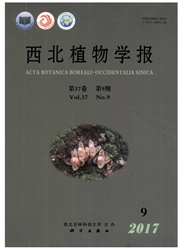

 中文摘要:
中文摘要:
病原物诱导型启动子能精确控制抗病基因在侵染位点的表达,是抗病基因工程的有效工具。prp1-1是来自马铃薯谷胱甘肽巯基转移酶基因启动子的一个273bp的片段,能够快速准确地启动被侵染位点抗病基因的表达;Rs-AFP2是具有对致病性丝状真菌的广谱抗性。该研究构建prp1-1调控Rs-AFP2基因表达的载体,经农杆菌介导转化法导入辣椒。逆转录PCR检测发现,转基因辣椒只在受到疫霉菌孢子侵染时,才由prp1-1启动Rs-AFP2基因的转录。用疫霉菌孢子灌根接种转基因辣椒T1代植株,35株T1代辣椒中有29株表现出明显的疫霉菌抗性。另将23株T1代辣椒种于人工气候箱,发现其形态和发育特征与相同条件下的非转基因植株无明显区别。研究表明,prp1-1调控Rs-AFP2的诱导表达达到了增强辣椒疫霉菌抗性的目的,而且避免了负面效应的发生。
 英文摘要:
英文摘要:
Pathogen inducible promoters are helpful for genetic engineering on disease resistance by restricting expression to infection sites. A 273 bp fragment from the promoter of potato glutathione S transferase gene, named as prpl-1, could mediate rapid and strictly localized transcriptional activation at infection sites. Rs AFP2 ex errs antifungal activity against a broad spectrum of plant pathogenic filamentous fungi. Rs-AFP2 gene under the control of pathogen inducible promoter prpl-1 was introduced into pepper by Agrobacterium tume,/acierls mediated transformation. Reversed transcript PCR results showed that the Rs-AFP2 gene was induced to transcribe only after inoculation with the zoospores of Pkytopttkora capsici. Tested by root irrigating with the zoo spores of P. capsici,29 of 35 Rs-AFP2 transgenie T lines enhanced resistance markedly. Other 23 T lines were planted in soil of growth cabinet. And no effect on plant morphology was observed at the Rs AFP2 transgenic T lines. The results suggest the inducible expression of Rs-AFP2 derived by prpl-1 could enhance pepper disease resistance to P. capsici and avoid the adverse effect.
 同期刊论文项目
同期刊论文项目
 同项目期刊论文
同项目期刊论文
 期刊信息
期刊信息
